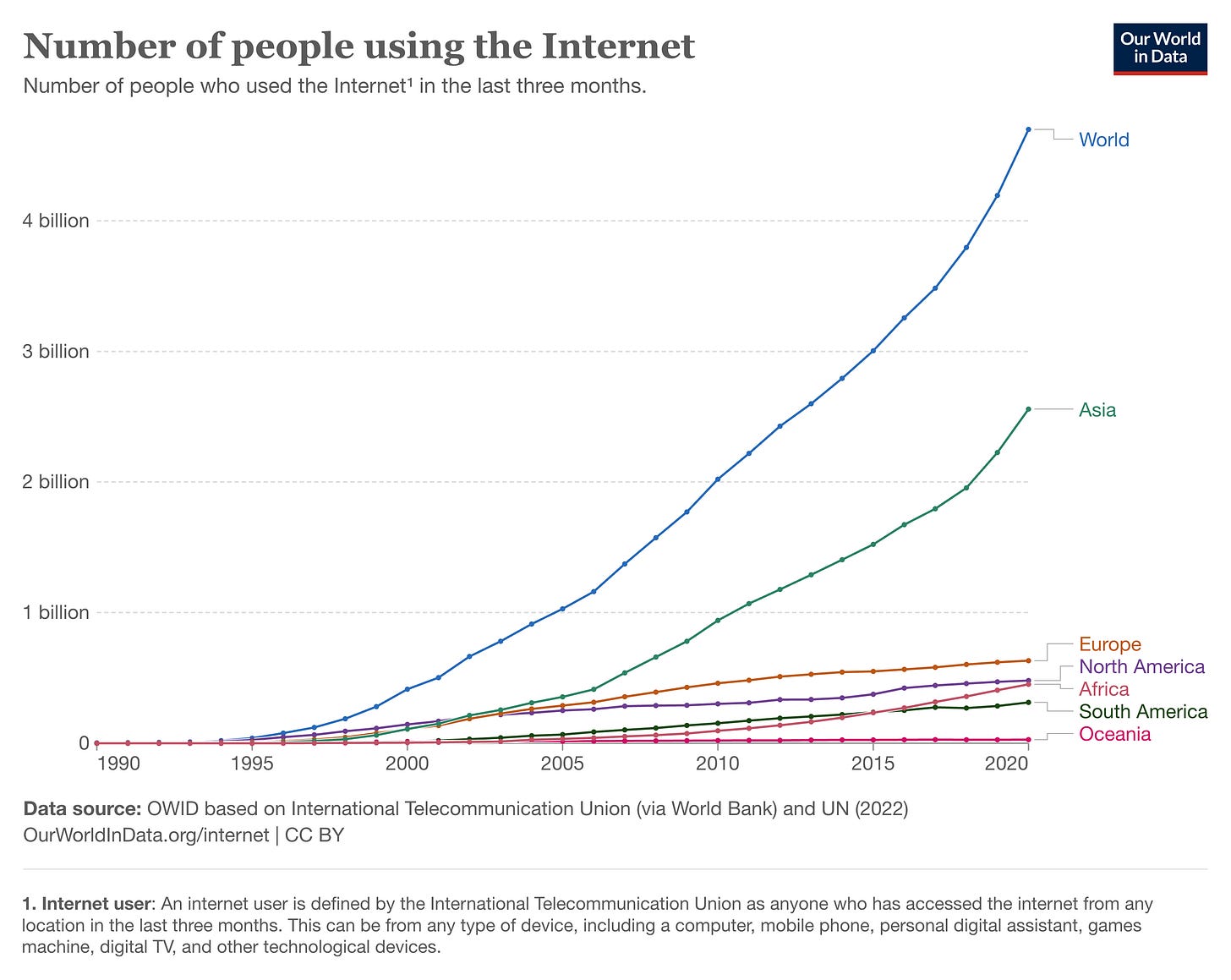What happens when you send an email or a ‘like’ on social media by hitting that ubiquitous thumbs-up icon? What is the geography of those billions of clicks, and what is their material impact? And what environmental and geopolitical challenges are we not seeing?
To these questions posed by Guillaume Pitron could be added: how much energy was required to create this note and podcast? What inputs are required for you to be able to read and listen to it? These are things we simply do not think about: the whole digital experience feels ‘light’, it is in ‘the cloud’. But that cloud is very real and very heavy.
Look at these charts and then wonder: what resources are needed for this growth to be possible? What are the energy demands? What are the material requirements?
It is precisely such trends that Guillaume Pitron has been examining in his work:
The expansion of the digital universe is about connecting everything and everyone, everywhere and all the time. By pushing, without consideration of ethical questions, individuals to spend more time on the internet; by enhancing bandwidth and image quality; and then, by making billions of internet users interact with connected devices, the digital gurus are ushering in the dawn of the Internet of Everything…
And at what cost for the planet?
Pitron has been uncovering and examining the material realities of the unceasing advance of digital technologies, most notably through a pair of books: The Rare Metals War (La Guerre des métaux rares) and The Dark Cloud (L’Enfer numérique). In them, Pitron acts as an eye witness to how our digital world is constructed, what the hidden costs and consequences of our virtual practices are. While there has been a growing awareness of the impacts that the internet, smartphones and platform capitalism are having on mental health and society, there has been much less consideration of the material requirements and environmental costs of these technologies. Yet as Pitron tells us in The Dark Cloud:
even our most banal digital habits have a carbon impact. An email produces a minimum of 0.5 grams, and as much as 20 grams if there is an attachment — the equivalent of a light bulb switched on for one hour.
With technological advances, we are encouraged to see what is easier, what is faster, what is ‘better’. Rarely is there an accounting of the positives and negatives, and from that, some kind of measured judgement. This is hardly a new dynamic. Writing in 1964, Lewis Mumford observed:
I would not belittle, still less deny, the many admirable products this technology has brought forth, products that a self-regulating economy would make good use of. I would only suggest that it is time to reckon up the human disadvantages and costs, to say nothing of the dangers, of our unqualified acceptance of the system itself.
Here Pitron’s work provides a vital counter and contribution, pushing us to reckon with the materiality of the virtual, revealing the inputs, infrastructures and processes that are needed to create our computers, smartphones and deliver our platform economy and digital services in high resolution and with ever-increasing immediacy. In The Dark Cloud, he reflects:
I discovered that the internet has a colour (green), a smell (rancid butter), and even a taste (salty, like seawater). It also emits the strident din of an enormous beehive. All senses were engaged as I sized up the sheer excess of the digital world. To send a ‘like’, we use what is set to become the largest infrastructure ever created by humankind.
Yet day to day, we see, smell, taste nothing, it is only at those moments when we experience latency and lag that we might recall the digital world is really real.
Throughout his work Pitron emphasises the situated-ness and materiality of the technologies we use daily without thought or care. He looks at how rare earths are extracted and processed, what materials are needed for making our beautiful smartphones, the cables that are required to create ‘wireless’, the enormous environmental impact of the green transition, the geographies and geopolitics of all these processes and practices. Pitron offers no easy solutions or resolutions, what he does provide is a fuller, franker assessment of the costs and consequences of our collective choices. In looking at what we making, using and doing now, he is encouraging us to consider about what it all means for where we are going.
These are some of the themes that we pick up in our conversation, which only scratches the surface of what can be found in his thought-provoking books. Thanks to Guillaume and Peter for a stimulating discussion.
















